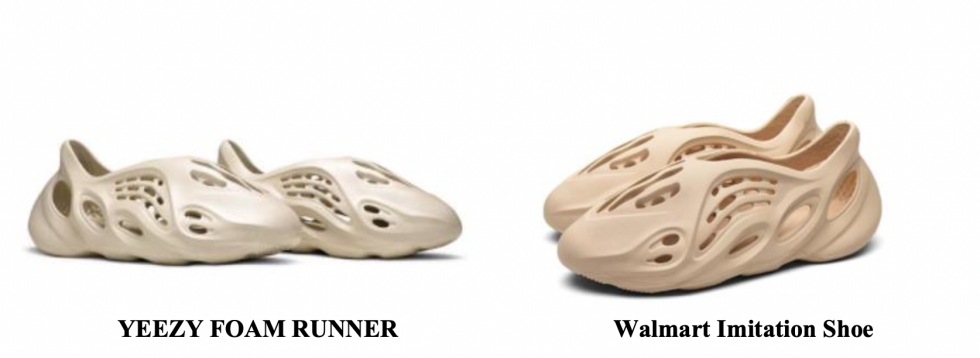Amid an existing battle over lookalike logos, Walmart and Yeezy are facing off in court, as well, after Yeezy and its founder Kanye West filed suit against Walmart and a handful of unnamed third-party Walmart sellers over the sale of copycat Yeezy foam runner footwear on the retail behemoth’s third-party marketplace site. On the heels of Yeezy and West naming Walmart and co. in an unfair competition complaint in California state court in June, Walmart is looking to get the case tossed out of court on the basis that it is shielded from liability by Section 230 of the Communications Decency Act.
According to the notice of demurrer that it filed on September 22, counsel for Walmart argues that West and Yeezy have failed to make their case on the unfair competition front, as they have not stated facts “sufficient to constitute a cause of action as a matter of law because the complaint fails to allege any unlawful, fraudulent or unfair conduct under the Unfair Competition Law” (namely, California Business and Professions Code s. 17200, which prohibits “any unlawful, unfair or fraudulent business act or practice and unfair, deceptive, untrue or misleading advertising,” and any acts that fall within a catch-all provision). Specifically, Walmart argues that they fail to “plead actual misconduct by [Walmart] and fail to allege grounds for vicarious or secondary liability for conduct of the actual seller of the subject shoes.”
Walmart argues that “it is utterly unclear as to what … allegedly constitutes an unfair business practice” in the situation at hand, as Yeezy and West’s complaint “obscures all facts regarding the nature of the seller [of the lookalike footwear], fails to allege that [Walmart] participated in the creation or development of the product listings at issue, declines to identify a single representation made about the shoes by anybody, and fails to allege any facts related to [Walmart’s] relationship with or control of third-party sellers on its platform.”

Walmart argues that a demurrer is also warranted because West and Yeezy’s claims are barred by Section 230 of the Communications Decency Act, which “preempts the cause of action to the extent that [West and Yeezy are] seeking to hold Walmart liable for the conduct of the seller” of the imitation footwear. Beyond that, Walmart argues that the plaintiffs’ quantum meruit claim fails, as well, as “there is no cause of action for unjust enrichment in California,” and even if the claim is construed as one for quasi-contract, the retailer asserts that “it fails for all the same reasons the [unfair competition claim] fails.”
In relying on Section 230, Walmart is seeking to escape liability on the basis of the 1996 federal law, which was originally designed to protect online websites from defamation lawsuits for user-generated speech, and states that “[n]o provider or user of an interactive computer service shall be treated as the publisher or speaker of any information provided by another information content provider.”
Defamation is not the cause of action at hand here. However, Section 230 is potentially still a lifeline for Walmart, as it has been invoked in response to an array of claims, including unfair competition. And as professors Benjamin Edelman and Abbey Stemler have noted, “Online marketplaces, in particular, have tried to use Section 230 to protect themselves from everything from product liability to obligations under a myriad of state and local rules,” unfair competition, included.
(Generally, for a provider to benefit from immunity under Section 230, three conditions must be met: (1) the provider is a “provider or user of an interactive computer service;” (2) the information which the plaintiff seeks to hold the provider liable is “information provided by another information content provider;” and (3) the plaintiff’s claim seeks to hold the provider liable as the “publisher or speaker” of that information.)
While Walmart does not elaborate on its Section 230 argument in the demurrer filing, it may have an easier case to argue here from a Section 230 perspective in light of the fact that Yeezy and West did not assert an actual trademark infringement claim in connection with the lookalike footwear, and given that one of the exceptions to Section 230 immunity is for “any law pertaining to intellectual property.” At the same time, Yeezy and West’s unfair competition claim does clearly stem from the sale of a copycat shoe style on Walmart’s third-party site – one that the plaintiffs emphasize is clearly tied to the Yeezy brand, hence the language in the complaint about the similarity of the respective footwear designs, the likelihood of consumer confusion, and the impact of the copycat footwear on its goodwill.
It is worth noting, as the Congressional Research Service did in a Section 230 review this spring, that courts have “expressed different interpretations” when it comes to handling intellectual property claims and Section 230. The Ninth Circuit, for one, has “construed the intellectual property exception narrowly, to include only ‘claims pertaining to an established intellectual property right . . . like those inherent in a patent, copyright, or trademark,’” and thus, held that the intellectual property exception did not apply to a Lanham Act false advertising claim.
At the same time, some courts have held that “the exception does include state intellectual property claims, allowing, for example, state law claims for copyright infringement, misappropriation, and unfair competition, and right of publicity to proceed.” Meanwhile, “other courts, including the Ninth Circuit, have held that Section 230(e)(2) encompasses only federal laws and that Section 230 bars state intellectual property claims.”
Walmart’s demurrer comes six months after Yeezy and West filed suit against it, and follows from the retailer’s initiation of an opposition proceeding with the U.S. Patent and Trademark Office’s Trademark Trial and Appeal Board over their respective sun ray logos. In their complaint, Yeezy and Weat argue that Walmart and the unnamed third-party sellers were “flagrantly trading off of [Kanye] and the Yeezy brand’s popularity by offering for sale an imitation version of the Yeezy Foam Runner.” By selling footwear that “imitates … the original and distinctive Yeezy Foam Runner” and that amounts to an “unauthorized exact copy of the Yeezy [shoe] in every respect, including the clog-silhouette, foam slip-on body, and characteristic varying-sized cutouts on the sides and top of the shoe,” Walmart and the other defendants are causing significant harm to the “multi-billion dollar” Yeezy brand and confusing consumers in the process, per West and Yeezy.
Beyond that, West and Yeezy claim that “by trading off of [their] popularity and goodwill to increase sales of the imitation shoe, without authorization or compensation to the plaintiffs,” Walmart and the other defendants “have unjustly enriched themselves to the detriment of the plaintiffs,” and thus, they set out a claim of quantum meruit in order to regain the profits that were allegedly amassed by the defendants in an unjust manner. Aside from monetary damages, including “restitution or disgorgement of the defendants’ profits,” Yeezy and West are looking for injunctive relief in order to formally bar the defendants from engaging in such conduct going forward.
The case is Kanye West and Yeezy LLC v. Walmart Inc., et al., 21STCV23514 (Cal.Sup.)











